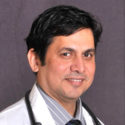Cardiovascular disease is largely preventable, thanks to routine checkups with your physician and living a healthy lifestyle. If you are, or think you may be at risk for heart disease, don’t wait to see a cardiologist, it could just save your life.
There is a reason heart disease is one of the leading causes of death in the United States. One of the main causes of heart disease is high blood pressure, also known as a silent killer, because it often presents no symptoms. Whether you have high blood pressure or not, it is important to see your primary care physician to discuss your current state of health and medical background.
If you have a strong family history of heart problems, or have been told your blood pressure or cholesterol levels are high, seeing a cardiologist has probably crossed your mind. A cardiologist won’t just treat you if you have already been diagnosed with heart disease, they work with patients to prevent it as well. Cardiac issues affect people of all ages, so even if you do not have symptoms or reason to worry now, it is always in your best interest to consult with a cardiologist, especially if recommended by your primary care physician.
Speaking with your primary care physician will help them to determine if seeing a cardiologist is necessary. Over time if you begin to exhibit symptoms such as chest discomfort, shortness of breath, or dizziness, your physician may refer you to a cardiologist. If these symptoms are sudden and getting worse, you may already be in the stages of heart failure or having a heart attack and should seek emergency care immediately.
If your physician has recommended you see a cardiologist, you may have some questions before going in for your first visit. Cardiologist Dr. Arif Syed, MD has some answers.
Question: What are some common reasons a physician may refer me to a cardiologist?
Dr. Arif Syed: You should see a cardiologist if you have any of the following conditions or comorbidities: chest discomfort, shortness of breath, swelling in your legs, high blood pressure, abnormally fast or slow heart rate, dizziness or fainting, leg pain or ulcers resulting from blood vessel diseases, or have a family history of premature heart disease or cardiac death.
Q: Does my insurance cover cardiology visits?
AS: Most insurances will. Be sure to confirm this with your insurance provider before your appointment.
Q: Do I need a referral from my physician to see a cardiologist?
AS: This also depends on your insurance.
Q: If the cardiologist finds something concerning, what will they do for me?
AS: There are a number of tests a cardiologist may run, including: stress testing, transthoracic echocardiogram, ambulatory EKG monitor, pharmacologic nuclear stress test, loop recorder implantation, cardiac pacemaker implantation, coronary angiography/stent placement, or they will make a decision on transcutaneous aortic valve replacement. They may also refer you to a specialist or surgeon if they suspect you are in advanced heart failure, need cardiac surgery or open heart surgery.
Q: How do I know if my chest pain is an emergency or something else?
AS: Call 911 or have someone take you to the closest emergency room right away if you are having chest pain that lasts longer than five minutes and doesn’t go away with rest and medication.
Q: What are some things my cardiologist needs to know about me?
AS: Your cardiologist will perform a detailed clinical examination and discuss your health history during your visit.
 | Arif S. Syed, MDCardiology, Internal Medicine, Cardiovascular Disease |
Staying on top of your heart health is of vital importance. Many people are at a greater risk of developing heart disease and do not know it. Attending routine checkups and physical exams with your physician is the first step to keeping yourself healthy. If your doctor notices anything unusual or concerning, they will refer you to a specialist such as a cardiologist. There are many factors that cause heart disease, hence why it is always important to listen to your body, and maintain an active and healthy lifestyle. Taking these steps will reduce your risk of heart disease, and ensure you live a longer, healthier life.
